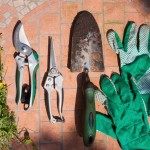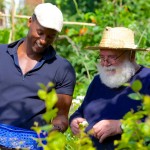Spring is bursting upon us and Anne Swithinbank a horticulturist explains how getting out into the garden could be the antidote too boost your mood and wellbeing.
Gardeners are optimistic characters. They’re always making plans and looking ahead. They’re out there now, watching for shy flowers on shrubs and looking for the first signs of snowdrops breaking the soil. And while we’re out there tending our plots, the positive effects that being in the outdoors has on our health and wellbeing should not be underestimated.
MAKE A COMMITMENT
If you find it difficult to venture out regularly why not hang up a bird feeder? You’re then committed to topping it up with food and water. Once outside you’ll notice some pruning that needs attending to, or if soil conditions allow, a spot of weeding and mulching to do. Before you know it, two hours will have passed and it will be time for tea. Happily immersed in tending your plot you will have forgotten about the daily stresses of life. What’s more you will have stretched your muscles and soaked up some winter sun, stimulating the production of vitamin D, which helps the body absorb calcium – essential for healthy bones.
BRAIN BENEFITS
As well as keeping you fit many studies have shown that gardening lifts mood, helps maintain circadian rhythms (the body’s daily sleeping and waking patterns) and can even help protect against dementia. Two separate studies that followed people in their 60s and 70s found that regular gardeners up to 47 per cent less likely to develop dementia than non-gardeners. Gardening can also make you more aware of life. We think we own our plots but we’re sharing them with many other creatures, from microbes in the soil to minibeasts like centipedes and larger, more obvious residents such as frogs, toads, birds and bees. Even the caterpillars and aphids we view as pests are important, as they provide food for the more loveable creatures and outwitting them is fun. Out there, you really experience the weather and seasons turning.
KEEP MOBILE
Keeping active is important both for physical and mental well-being. It can, however, be easy to get carried away with gardening.
Take Breaks. Limit time doing one activity. Weed for half an hour then stand up, stretch or get a drink of water. Then change your activity like switching to light pruning or raking.
Stay Hydrated. Dehydration can contribute to muscle soreness, so drink plenty of healthy fluids. Take water breaks and do remember to protect your skin with a sun hat, gloves, and a suntan lotion because if you suffer from arthritis some medications can make you more susceptible to sunburn.
Robert Hobson, Head of Healthspan Nutrition explains, ‘Muscle pain can result from inflammation, so try and include anti-inflammatory foods into your diet such as oily fish, flaxseeds, and pumpkin. Plus include brightly coloured fruit and vegetables which are high in anti-oxidants to help combat free radical activity.
Use Knee Pads. When weeding, use foam pads or knee pads. There are small scooters or lightweight stools to sit on which can protect your knees and back.
Dr Sarah Brewer, GP and nutritionists says, “There are several natural alternative ways to beat common aches and pains caused by gardening. Devil’s Claw is a natural herbal painkiller for low back pain and inflamed joints and a product called Natural Eggshell Membrane is new to the UK but has sold over 70 millions doses in the US and essentially, it contains the same elements found in your joints, which are needed to repair and rebuild cartilage and ligaments,” says Dr Brewer.
Use Proper Tools. Tools with extensions (long handles) to allow you to avoid kneeling or crouched position. Small hand tools with springs to help open and close will decrease the chance of tendonitis.
Following strenuous activity, nothing soothes like a warm bath! Heat increases the circulation and relaxes tired, aching limbs. Adding mineral salts to the bath provides additional benefits by cleansing and detoxifying the body. Try creams such as Celadrin with the added benefit of natural comfrey leaf extract to help soothe.
If you have some soreness after gardening, ice the area 5-20 minutes a couple of times a day. If you experience continued pain, swelling and weakness, medical consultation may be appropriate.
Green tips
In the greenhouse, sow seeds of broad beans and hardy lettuce to plant out later.
Prune your wisteria by cutting last year’s long growths back to two buds.
If you have no outdoor garden, keep some house plants. Prayer plants, Swiss cheese plants and moth orchids are fascinating and if you find the right position, will last for years.
Visit http://www.rhs.org.uk/gardening for further gardening advice and tips for this time of year.





